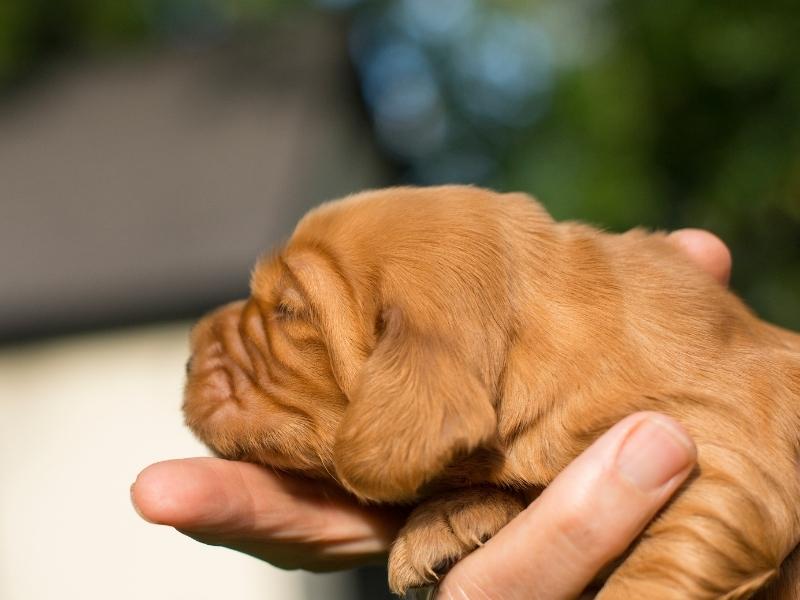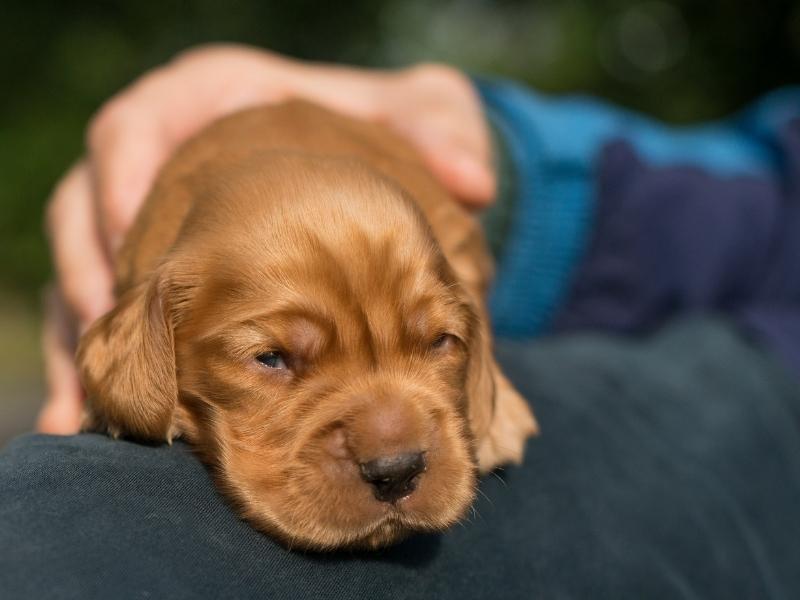Unlike human babies, puppies aren’t born with their eyes open. Newborn puppies spend most of their time sleeping and eating and are relatively immobile, so they don’t need their eyesight right away.
So, when do puppies open their eyes? Most puppies open their eyes when they are 10 to 14 days old. When puppies are born, their optical nerves aren’t fully developed, making their eyes very sensitive to sunlight. After puppies are born, their eyes are still forming, so the eyelids stay closed to keep the eyes protected.
While it can take up to two weeks for most puppies to open their eyes, some breeds develop their eyesight faster than others. Read on to learn more about your puppy’s eye development and how to care for a new puppy.
How Long Does It Take for Puppies to Open Their Eyes?
All puppies are born blind, deaf, and toothless. It generally takes around 10 to 14 days for puppies’ eyes to open.
Some breeds may take longer to open their eyes. For example, Cocker Spaniel puppies usually open their eyes sooner than Fox Terrier puppies. Different breeds of dogs develop at different rates, so it’s not surprising that some puppies open their eyes sooner than others.
After puppies are born, their eyelids stay closed for a good reason. The newborn puppy’s optical nerves are still developing, making the eyes hypersensitive to light.
The nerves inside a puppy’s eyes are still undeveloped, so the eyelids stay closed to keep the eyes protected and give them time to develop correctly.
In around 10 to 14 days, the puppy will become ready and open its eyes. More often than not, puppies open one eye at a time over the course of several days.
Even after their eyes are open, puppies don’t have good or clear vision. The optical nerves inside the eyes continue to develop even after the puppy opens its eyes. Because of this, the puppy’s vision continues to improve for the next couple of weeks.
What Happens If You Open a Puppy’s Eyes?

There’s no way of knowing when your puppy will open its eyes. Even puppies from the same litter won’t open their eyes on the same day. Bigger puppies usually open their eyelids one or two days before their smaller littermates.
Don’t attempt to open your puppy’s eyes even if it’s more than two weeks old and its eyelids are still closed. Forcing a puppy’s eyes open can be extremely painful and lead to infection or injury.
Touching the closed or partially closed eyelids isn’t a good idea either, as it may transfer dust, dirt, or debris inside your puppy’s eyes. This, in turn, can lead to a painful infection or bacterial growth that can damage your pup’s eyesight.
Forcing a puppy’s eyelids open while the major physical development is underway can cause permanent blindness.
Puppies younger than four weeks of age don’t have a good blinking reflex and can’t blink to protect their eyes. This puts young puppies at a higher risk of sustaining damage to the surface of their eye, known as the cornea.
Call your vet if more than two weeks have gone by and your puppy’s eyes are still closed or if you notice swelling or discharge around the eyes. In this case, your veterinarian will clean and may even attempt to open your pup’s eyes manually if that is in the puppy’s best interest.
When Should the Puppies Start to Stand and Take an Interest in Their Surroundings?
As soon as puppies open their eyes and start to see the world around them, they will also begin to change and develop physically.
A healthy two-week-old puppy should be alert and try to stand on all four feet. By three weeks of age, all healthy puppies should be trying to find ways to climb out of the whelping box.
By the one-month mark, all puppies should be able to walk, run, play, and be interested in exploring their surroundings.
Puppies that don’t meet these essential developmental milestones are at a higher risk of permanent impairment and death.
Contact your vet if you notice that one of your puppies isn’t as interested in its surroundings as for its littermates. Also, don’t hesitate to call your vet if you observe any developmental abnormalities in your puppies.
Care Tips on Raising a Puppy
Whether you have a new pup or expect a litter soon, make sure you are prepared. Here are a few helpful tips for caring for new puppies:
1. Make Sure You Have the Right Supplies
Ensure you have all the essential supplies before bringing the new puppy home. This means you’ll need to prepare a comfortable puppy bed or a crate, a blanket, food and water bowls, and healthy puppy food.
Besides these essentials, you’ll also need pee pads, an adjustable collar, a leash, poop bags, ID tags, and a microchip in case your pup gets lost.
2. Puppy Proof Your Home
Puppies are curious creatures that can quickly wreak havoc in your home if you aren’t careful. Inspect your house. Cover any exposed electrical cords, remove poisonous plants and flower pots, and keep your trash under wraps.
3. Training & Socialization
Begin housetraining your puppy as soon as you bring it home. Dogs instinctively avoid soiling their beds. So, keeping your puppy contained in a crate or a puppy playpen as it gets used to going outside can speed up the potty-training process.
Conclusion
All puppies are born blind with their eyes closed. Most pups open their eyes when they are around two weeks old, though some puppies may need more time. More often than not, puppies will first open one eye, and the other eyelid may remain closed for a few more days.
Whether your puppy opens both eyes at once or not, do not attempt to open your puppy’s eyes manually. Forcing your pup’s eyes open can damage its vision or make your puppy permanently blind.
Related Articles:


0 Comments